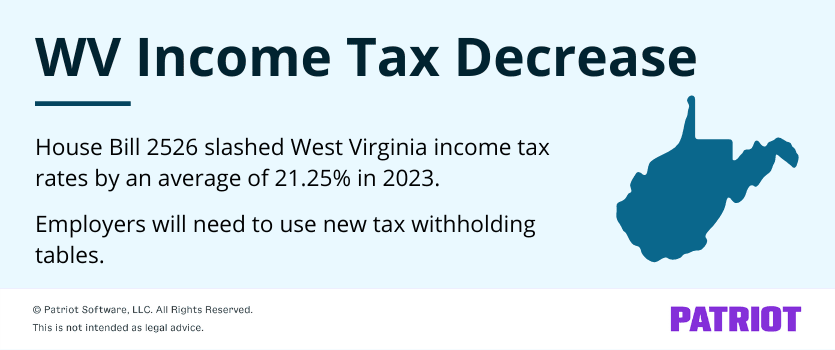Are you an employer in West Virginia? If so, you might have heard about House Bill 2526, a 2023 law that significantly cut individual income tax rates. As a result, your West Virginia income tax withholding might look a little different.
In this article, we’ll go over:
- What compensation is subject to withholding?
- West Virginia income tax updates
- What do West Virginia employers need to do?
- Are there penalties for income tax withholding issues?
What compensation is subject to withholding?
Employers are responsible for federal, state, and local payroll tax withholding. Employers who pay wages that are subject to West Virginia income taxes must withhold and remit the state tax.
In West Virginia, any compensation subject to federal withholding is also subject to state withholding. This includes:
- Wages
- Commissions
- Fees
- Salaries
- Bonuses
- Vacation allowances
- Back pay
- Tips
- Retroactive wage increases
- Remuneration for or compensation attributable to services performed
WV income tax withholding varies by employee. It depends on how many exemptions an employee claims on Form WV IT-104, their pay frequency, and their wages. To determine state income tax withholding, use West Virginia’s withholding tax tables.
After withholding WV income tax, you must remit the tax to the state on or before the 15th day of the next month. And, you need to file quarterly returns using West Virginia’s IT-101V.
West Virginia income tax updates
West Virginia’s governor signed House Bill 2526 into law on March 7, 2023.
The bill slashed individual income tax rates by an average of 21.25%, making it the largest tax cut in the state’s history.
What is the new West Virginia income tax rate?
The top income tax rate fell from 6.5% to 5.12% and the lowest rate fell from 3.0% to 3.36%.
Take a look at the new income tax brackets for single filers, married filing jointly, heads of households, and estates and trusts:
| Annual Earnings | 2022 Income Tax Brackets | 2023 Income Tax Brackets (NEW) |
|---|---|---|
| Not over $10,000 | 3.0% | 2.36% |
| Over $10,000 but not over $25,000 | 4.0% | $236 + 3.15% of excess over $10,000 |
| Over $25,000 but not over $40,000 | 4.50% | $708.50 + 3.54% of excess over $25,000 |
| Over $40,000 but not over $60,000 | 6.0% | $1,239.50 + 4.72% of excess over $40,000 |
| Over $60,000 | 6.50% | $2,183.50 + 5.12% of excess over $60,000 |
Here are the new income tax brackets for individuals who are married filing separately:
| Annual Earnings | 2022 Income Tax Brackets | 2023 Income Tax Brackets (NEW) |
|---|---|---|
| Not over $5,000 | 3.0% | 2.36% |
| Over $5,000 but not over $12,500 | 4.0% | $118 + 3.15% of excess over $5,000 |
| Over $12,500 but not over $20,000 | 4.50% | $354.25 + 3.54% of excess over $12,500 |
| Over $20,000 but not over $30,000 | 6.0% | $619.75 + 4.72% of excess over $20,000 |
| Over $30,000 | 6.50% | $1,091.75 + 5.12% of excess over $30,000 |
Heads up, employers! Because of the decreased individual income tax rates, West Virginia released new tax withholding tables for payroll tax withholding. If you do payroll by hand, view the new percentage method or table method revisions. If you use online payroll software, your system should automatically update the rates for you.
When does the new WV state income tax rate take effect?
The decreased WV state income tax rates are retroactive to January 1, 2023.
Did WV’s supplemental tax rate change?
Like the majority of states, West Virginia has a state supplemental tax rate. Employers can withhold this rate from supplemental wages in place of standard state income tax withholding. Supplemental wages include bonuses, commissions, back pay, and paid time off payouts.
House Bill 2526 lowered West Virginia’s supplemental income tax rates. The rate you use depends on the employee’s gross salary.
Use the following chart to compare West Virginia’s 2023 supplemental tax rates and 2022 rates:
| Annual Earnings | 2022 Supplemental Tax Rates | 2023 Supplemental Tax Rates (NEW) |
|---|---|---|
| Not over $10,000 | 3.0% | 2.36% |
| Over $10,000 but not over $25,000 | 4.0% | 3.15% |
| Over $25,000 but not over $40,000 | 4.50% | 3.54% |
| Over $40,000 but not over $60,000 | 6.0% | 4.72% |
| Over $60,000 | 6.50% | 5.12% |
West Virginia’s supplemental tax rates are also retroactive to January 1, 2023.
What do employers need to do about the new rates?
Employers are responsible for updating their payroll withholding in response to the decreased West Virginia income tax rates.
Again, you must use one of the following revised withholding tables if you do payroll by hand:

Although the new individual income tax rates are retroactive to January 1, 2023, you do not need to adjust prior paychecks. Instead, employees will receive the difference when they file their 2023 annual income tax return in 2024.
For more information, head to West Virginia’s website.
Are there penalties for income tax withholding issues?
Yes, there are penalties for failing to withhold and remit the correct amount of state income taxes. Penalties include interest and “additions to tax.”
Employers who fail to remit withheld taxes by the due date of the return may be subject to interest. According to the state, the interest rate can change, but it is never less than 8%.
West Virginia imposes additions to tax if you don’t file a return by the due date. The penalty amount ranges from 5% – 25% of the tax due per month.
The state also imposes additions to tax if you fail to pay due taxes on a return by the due date. The penalty amount ranges from 0.5% – 25% of the tax due per month.
If you’re subject to both additions to tax penalties, West Virginia sets a maximum monthly penalty of 5%, not to exceed 50% of taxes due.
Don’t want to deal with penalties? Who does! Sign up for Patriot’s Full Service Payroll. We’ll file and deposit your federal, state, and local payroll taxes on your behalf. And, we offer a tax filing reliability guarantee so you can rest easy. Get your free trial today!
This is not intended as legal advice; for more information, please click here.






